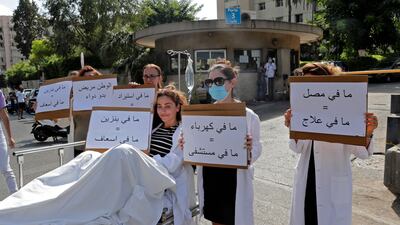Petrol stations must give priority to medical staff filling their tanks from Monday, Lebanon’s General Directorate of Oil said in a statement.
Lebanon has been suffering from severe shortages of fuel for months as cash-strapped authorities struggle to pay on time for deliveries of subsidised petrol.
“The General Directorate of Oil requires all fuel stations to give priority to medical staff to fill their cars. This procedure will be implemented as soon as it is issued,” the statement said.
Fuel scarcity is threatening the lives of patients as hospitals ration diesel for their private generators and medical staff struggle to find enough petrol to drive to work.
The head of Lebanon’s Order of Physicians said in a statement that he had received numerous calls from doctors “complaining about the difficulty of going to the hospital” because their cars had run out of fuel and they were unable to fill their tanks.
“Emergency and surgery patients are paying the price for the absence of specialist doctors,” Dr Sharaf Abou Sharaf said, urging security personnel to implement the Oil Directorate’s decision.
Medical staff told The National they fear the decision will not be implemented due to shortages of fuel at the petrol pumps and a lack of effective enforcement.
A representative for Beirut’s largest public hospital said “this decision is simply ink on paper. We need a serious mechanism to enforce it.”
The fuel supply crisis is another blow for Lebanon’s overwhelmed healthcare sector, which is already grappling with medicine shortages, 20-hour power cuts and the effects of the country’s economic collapse.
Since late 2019 a severe economic crisis, caused in part by a shortage of foreign currency, has led to essential products such as fuel and medicine being subsidised and imported using severely depleted dollar reserves.
Lebanese authorities announced on Saturday that they will reduce fuel subsidies. The decision prompted a 66 per cent rise in prices overnight but is expected to ease shortages.
Long queues form in front of petrol stations, and there have been a number of incidents where deadly gunfights have erupted.
Drivers often wait in line for hours to fill their tanks while others pay far more than the official price of petrol on the black market to jump the queue.
Doctors told The National they were struggling to get to their workplaces, with some opting to walk to work, despite the summer heat.
Layale Olaymoun, a critical care physician and pulmonologist at a Beirut hospital said “some doctors are coming by foot” to work, while others are sleeping at the hospital.
“The whole system is breaking down. Everyone is burnt out, the nurses, the doctors, and the patients too.”


